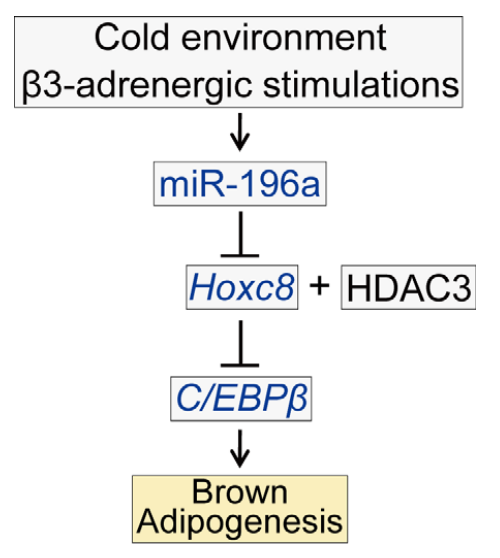Creative Biolabs is the world leading service provider for the discovery of in vitro diagnostics (IVD) antibodies. Based on our years of experience and advanced platform, we are confident in offering the best and most suitable IVD assays service against various markers for pancreatic cancer.
miR-196 is affiliated with the miRNA class and it was transcribed from homeobox (HOX) clusters. In Homo sapiens, miR-196a-1 is located on chromosome 17 at 17q21.32 (Gene ID: 406972), downstream of HOXB8 and HOXB9 genes and upstream of HOXB10 gene. miR-196a-2 is located on chromosome 12 at 12q13.13 (Gene ID: 406973) between HOXC10 and HOXC9, in a highly conserved region. HOTAIR is located upstream of miR-196a-2.
The Regulation of miR-196a in Tumor Cell
miRNAs are class of small, single-stranded, non-protein-coding endogenous RNA molecules ranging from 19 to 25 nucleotides. It has been shown that miRNAs play a role in post-transcriptional regulation of gene expression through translational inhibition as well as mRNA cleavage, and involve multiple biological processes which include cell proliferation, differentiation, apoptosis, stem cell development, and various human diseases by regulating expression of a variety of target genes. Research has demonstrated that miR-196a can directly target the cyclin-dependent kinases (CDKs) inhibitor p27kip1 by interacting with its 3’-UTR. A tumor suppressor, HOXA5, was thought to be negatively regulated by miR-196a. Furthermore, in glioblastoma, miR-196a facilitates cell proliferation and suppresses cell apoptosis in cancer cells via repression of IκBα, an important modulator of apoptosis and invasion.
 Fig.1 MiR-196a-regulated brown adipogenesis of WAT-progenitor cells.1
Fig.1 MiR-196a-regulated brown adipogenesis of WAT-progenitor cells.1
miR-196a Marker in Cancer Diagnosis
Biomarkers can function as traceable substances to help clinicians examine the status of diseases, evaluate pathogenic processes, and assess pharmacologic responses. miR-196 is upregulated in a multitude of cancers that include head and neck cancer, glioblastoma, oral cancer, breast cancer, pancreatic cancer, cervical cancer, gastric cancer, lung cancer, esophageal cancer, and acute myeloid leukemia. Previous studies have shown that miR-196a expression was markedly upregulated in gastric cancerous tissues by 22.9-fold compared with corresponding normal tissues. And combined with the detection of miR-148a, the serum level of miR-196a can identify gastric cancer with a sensitivity of 80%, specificity of 96.97%, as well as an area under the curve value of 0.924. With regard to the prediction of miR-196a-related prognosis, the correlation between the dysregulation of miR-196a in gastric cancer tissue and the tumor size as well as the advanced pathologic stage has been identified by researchers. Abundant related studies have shown that miR-196a as a direct prognosis factor keeps associated with clinical outcome of patients with malignant cancers.
With the accumulated experience in the past decades, Creative Biolabs now can offer the excellent IVD assays services for miR-196a marker for our clients. If you are interested in our service, please do not hesitate to contact us for more details.
Reference
- Mori, Masaki, et al. "Essential role for miR-196a in brown adipogenesis of white fat progenitor cells." PLoS biology 10.4 (2012): e1001314. Distributed under Open Access license CC BY 4.0, without modification.
For Research Use Only.